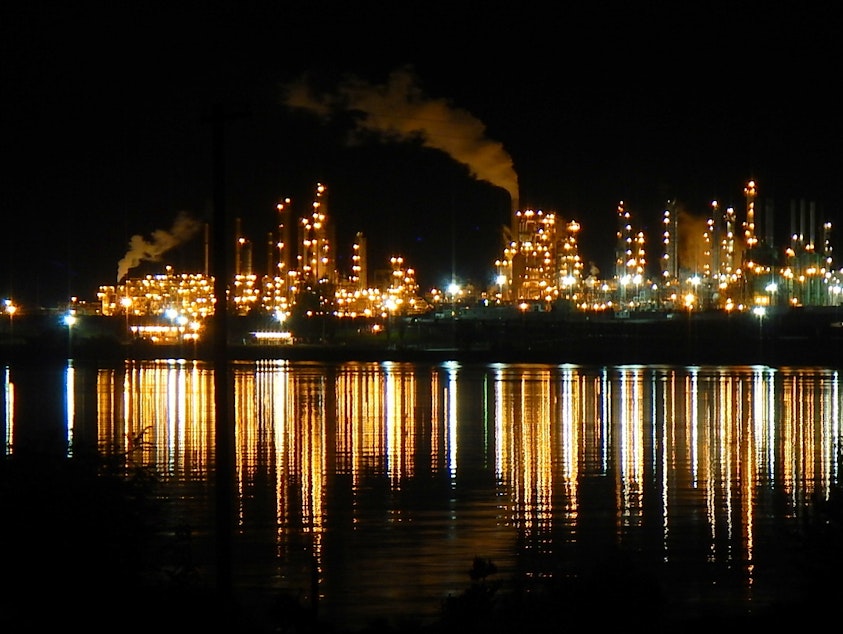Environmental justice moves to mainstream as governments embrace cause

Washington state’s five oil refineries all sit near, or on, Indian reservations.
Environmental justice advocates say that fact reflects a national pattern of air pollution disproportionately hitting people of color.
The Swinomish Reservation is next to two refineries: the Shell Puget Sound refinery and the neighboring Marathon Oil plant in Anacortes.
The BP and Phillips 66 refineries sit near the Lummi Reservation near Ferndale, while the U.S. Oil refinery in Tacoma is on the Puyallup Reservation in Tacoma.
Concerns about hazardous pollutants from the refineries wafting over their community led the Swinomish Tribe to put in two air monitoring stations.
Todd Mitchell with the Swinomish Department of Environmental Protection said the tribe is one of the few in the Northwest with the capacity to monitor hazardous air pollution.
“Our tribal people spend a lot of time outside, and we want to make sure things are safe for them,” Mitchell told a Gonzaga University conference on environmental justice in Washington state on Tuesday.
Sponsored
“We’re all kind of used to sheltering in place now because of quarantine, but that’s not something we regularly want to do for air quality,” he said.
Mitchell described an industrial accident that led to a major release of petrochemicals from the Shell refinery in 2015.
“The air release floated right down over the reservation, and there was air stagnation, so it sat on top of us for a while, and it affected our community, especially our elders,” he said.
According to the Northwest Clean Air Agency, wind from the north carried a cloud containing hydrogen sulfide, dimethyl sulfide, mercaptans, and benzene into the Swinomish Reservation and the town of La Conner.
“Hundreds of people reported symptoms that included irritation of eyes, throat and lungs, headaches, nausea, fatigue, and loss of appetite,” the agency reported.
Sponsored
Shell spokesperson Curtis Smith declined to comment on that incident.
“The Shell Puget Sound Refinery has a long history of meeting or exceeding air emissions standards and we remain committed to operating in a way that protects the health and safety of our employees and neighbors,” Smith said in an email. "That commitment includes the deployment of best available control technology, real-time monitoring of emissions and meticulous attention to maintenance."
According to the company website, Shell has spent $500 million over the past 15 years to make sure its Anacortes refinery meets or surpasses environmental regulations.
Shell paid a $133,000 fine to the Northwest Clean Air Agency for the 2015 incident.
Marathon Petroleum did not respond to an interview request. The company website says Marathon is a national leader in reducing refinery emissions.
Sponsored
Since 2015, the Northwest Clean Air Agency has issued seven “notices of violation” to the Shell Puget Sound refinery and 10 to the neighboring Marathon Petroleum refinery.
Going mainstream
Advocates have long pushed for governments to address the pollution they say unfairly burdens many communities of color.
Now, following a year of racial reckoning and four years of deregulation under the Trump administration, many governments say they are on board with putting the needs of disadvantaged, heavily polluted communities first.
Washington Attorney General Bob Ferguson’s office is hiring an environmental justice attorney, while the city of Seattle has a newly hired environmental justice team of five.
Sponsored
Ferguson on Tuesday offered his office’s support to any communities facing environmental injustices in the state.
Washington Insurance Commissioner Mike Kreidler on Wednesday urged the insurance industry to only cover industrial projects that have gained the consent of tribes they might affect.
“We have a unique opportunity to elevate environmental justice to a mainstream issue,” activist Paulina Lopez with the Duwamish River Cleanup Coalition said.
She said the fact that disadvantaged communities need clean air and clean water is finally getting the attention that other environmental concerns long have.
“A ZIP code should not determine how your health is,” she said.
Sponsored
On its first day in office, the Biden administration promised to “advance environmental justice” and consider it in all decision making.
The Washington state Senate passed a bill in March requiring seven state agencies (the departments of Agriculture, Commerce, Ecology, Health, Natural Resources, and Transportation and the Puget Sound Partnership) to do the same.
The bill is now being considered by the state House of Representatives.

